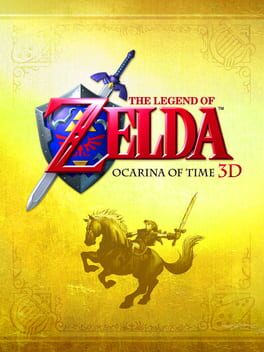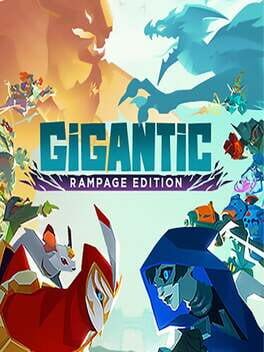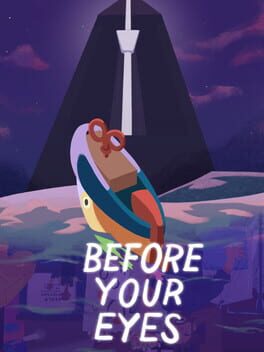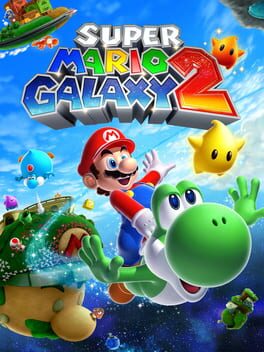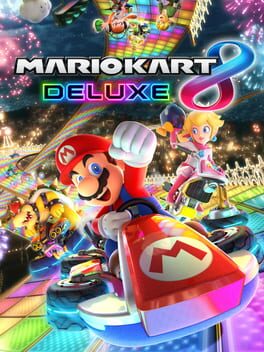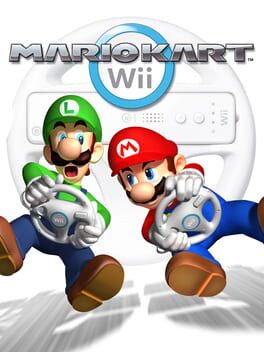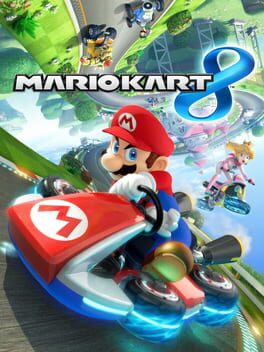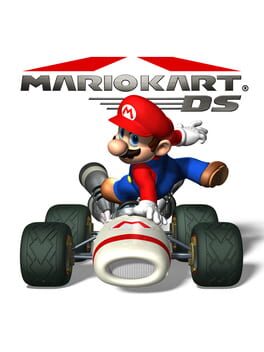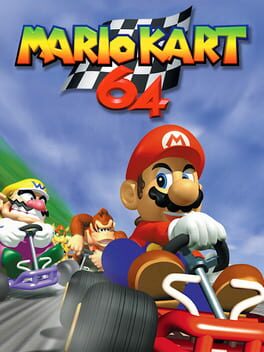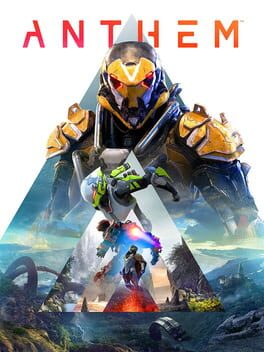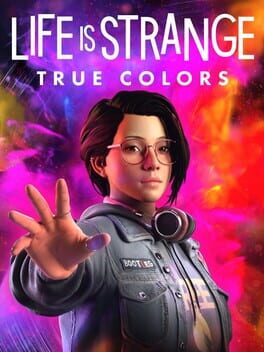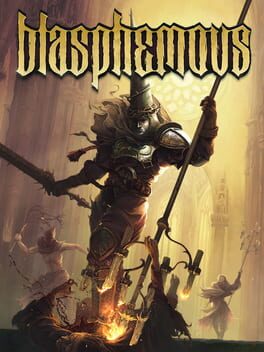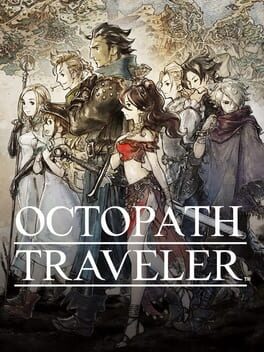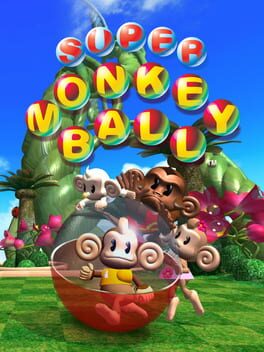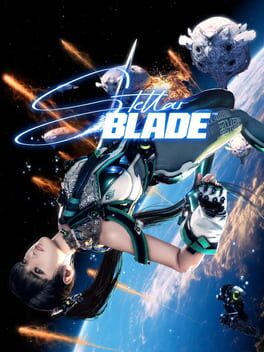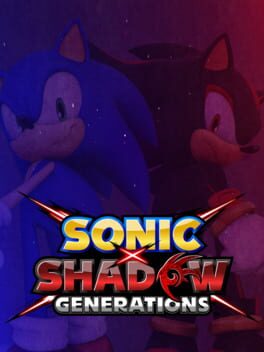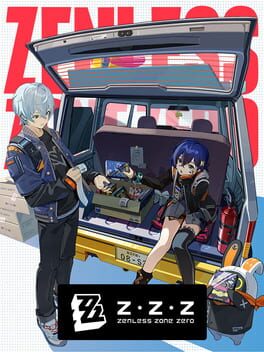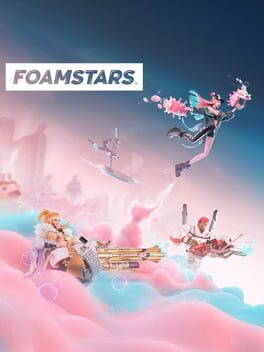Ribeirok
BACKER
97 reviews liked by Ribeirok
Super Mario 64
1996
So you're telling me this version...
- has better graphics
- has less annoying text speed
- has aiming that isn't garbage
- has a hint system for all those cryptic moments
- has a much less tedious to navigate Water Temple
- and has the Master Quest, an entire hard mode with not only harder enemies but also harder dungeons, included
...and yet some people say the N64 version is better?
- has better graphics
- has less annoying text speed
- has aiming that isn't garbage
- has a hint system for all those cryptic moments
- has a much less tedious to navigate Water Temple
- and has the Master Quest, an entire hard mode with not only harder enemies but also harder dungeons, included
...and yet some people say the N64 version is better?
Lies of P
2023
The developers kind of went mad with power during the late game, which is frankly too hard. I've beaten Sekiro, Hollow Knight, Bloodborne, Elden Ring... none of those games are as hard as Lies of P.
The difficulty comes in that you can seriously make purchasing and upgrade mistakes that limits your endgame power substantially. I opted to go for an "all weapons" run with the boss ergo, and locked myself out of end-game amulets. Additionally, I switched which boss weapon I was using, and the game punishes you by not supplying enough upgrade material to facilitate switching weapons.
Additionally, after 40 points in your primary stat, any additional levels only give you 1 or 2 extra damage, which makes your power curve logarithmic. In other souls games this is fine because the inflection point of the curve is past the end-game material. In Lies of P, this happens about 2/3rds of the way through the game. The bosses get more health and hit harder, but you don't get substantially more powerful once you hit level 65-70.
There's just little design issues like this sprinkled throughout the game that add up to a "it could have been a masterpiece" kind of experience. Ultimately, I can't recommend to the average person who plays games.
That said, there is an Easy Mode built into the game by the devs, but you have to re-enable it via mods. I stand firmly that when I review a game I can't factor in mods that fix its shortcomings, but if you're like me and just want a game that respects your time, google it.
The difficulty comes in that you can seriously make purchasing and upgrade mistakes that limits your endgame power substantially. I opted to go for an "all weapons" run with the boss ergo, and locked myself out of end-game amulets. Additionally, I switched which boss weapon I was using, and the game punishes you by not supplying enough upgrade material to facilitate switching weapons.
Additionally, after 40 points in your primary stat, any additional levels only give you 1 or 2 extra damage, which makes your power curve logarithmic. In other souls games this is fine because the inflection point of the curve is past the end-game material. In Lies of P, this happens about 2/3rds of the way through the game. The bosses get more health and hit harder, but you don't get substantially more powerful once you hit level 65-70.
There's just little design issues like this sprinkled throughout the game that add up to a "it could have been a masterpiece" kind of experience. Ultimately, I can't recommend to the average person who plays games.
That said, there is an Easy Mode built into the game by the devs, but you have to re-enable it via mods. I stand firmly that when I review a game I can't factor in mods that fix its shortcomings, but if you're like me and just want a game that respects your time, google it.
I waited for when the servers got fixed and as much as I want to say my nostalgia for this game holds up, It really doesn't. It kinda pains me to think a game I enjoyed a lot, given another chance to play it, isn't as fun as I remembered it being.
To all the fans happy that it's back, I pray for longevity for you. Just I kinda wish I let memories remain memories.
To all the fans happy that it's back, I pray for longevity for you. Just I kinda wish I let memories remain memories.
Joa, Spider-Man 2 ist einfacher Spaß, der sich schnell repetitiv anfühlt, aber auch leicht wegzuspielen ist. Was auch eigentlich der einzige Grund ist, warum ich's durchgespielt habe.
Man kann schnell viel Zeit verlieren. Allein mit dem immer noch spaßigen Swingen, welches so viel spaß macht, dass ich kein einziges Mal die Schnellreisefunktion benutzt habe.
Aber mein Gott, im großen Ganzen fühlt sich alles so langweilig an.
Eine langweilige Aktivität, Mission und Charakterinteraktion nach der anderen.
Ich hatte nie Interesse daran irgendwelche weiteren Nebenaufgaben zu erledigen, weil sie schlicht alle belanglos und ohne jeglichen Spaßfaktor waren.
Was ist denn bitte allgemein mit dem Missionsdesign passiert? Zahlreiche, langweilige Minispiele, bei denen ich mir immer wünschte, dass es hoffentlich gleich vorbei ist. Und dieser Flohmarkt... Erst ein nicht enden wollendes Rhythmusspiel und dann die spaßfreiesten Attraktionen die es jemals auf einem Flohmarkt gab.
Venom bzw. der Black-Spidy-Suite mit seinen wuchtvollen Fähigkeiten war aber eine tolle und willkommende Abwechslung.
Dann kommt aber auch noch eine Story, der jegliche Emotionen fehlt und erst nach der Hälfte des Geschehens wirklich in Fahrt kommt.
Spoiler: Wieso zum Teufel reagiert Harry kaum darauf, dass Pete seit Jahren Spider-Man ist? Nicht ein winziger Konflikt entsteht daraus??
Und nicht zu vergessen ein böser Kraven, welcher ständig abwesend ist und im Grunde nur für einen Bossfight existiert.
Apropos Bossfights. Die folgen allesamt dem Motto: So viele Phasen, bis der Spieler schlicht keine Lust mehr auf die gleiche Scheiße hat
Man kann schnell viel Zeit verlieren. Allein mit dem immer noch spaßigen Swingen, welches so viel spaß macht, dass ich kein einziges Mal die Schnellreisefunktion benutzt habe.
Aber mein Gott, im großen Ganzen fühlt sich alles so langweilig an.
Eine langweilige Aktivität, Mission und Charakterinteraktion nach der anderen.
Ich hatte nie Interesse daran irgendwelche weiteren Nebenaufgaben zu erledigen, weil sie schlicht alle belanglos und ohne jeglichen Spaßfaktor waren.
Was ist denn bitte allgemein mit dem Missionsdesign passiert? Zahlreiche, langweilige Minispiele, bei denen ich mir immer wünschte, dass es hoffentlich gleich vorbei ist. Und dieser Flohmarkt... Erst ein nicht enden wollendes Rhythmusspiel und dann die spaßfreiesten Attraktionen die es jemals auf einem Flohmarkt gab.
Venom bzw. der Black-Spidy-Suite mit seinen wuchtvollen Fähigkeiten war aber eine tolle und willkommende Abwechslung.
Dann kommt aber auch noch eine Story, der jegliche Emotionen fehlt und erst nach der Hälfte des Geschehens wirklich in Fahrt kommt.
Spoiler: Wieso zum Teufel reagiert Harry kaum darauf, dass Pete seit Jahren Spider-Man ist? Nicht ein winziger Konflikt entsteht daraus??
Und nicht zu vergessen ein böser Kraven, welcher ständig abwesend ist und im Grunde nur für einen Bossfight existiert.
Apropos Bossfights. Die folgen allesamt dem Motto: So viele Phasen, bis der Spieler schlicht keine Lust mehr auf die gleiche Scheiße hat
Before Your Eyes
2021
Control
2019
Hat zwar ein paar Probleme und auch beim zweiten Mal gab es hin und wieder Verwirrung darüber, wo genau ich gerade hin muss bzw. wie ich an mein Ziel gelange und ebenfalls erneut ein paar frustrierende Tode aufgrund der Platzierungen von gewissen Chechpoints. Aber macht halt schon ziemlich bock.
Und der visuellen Stil ist einfach großartig. Damit mein, ich neben der beeindruckenden Grafik, vor allem die Art Direction.
Remedy Spiele lohnen sich eigentlich immer.
Und der visuellen Stil ist einfach großartig. Damit mein, ich neben der beeindruckenden Grafik, vor allem die Art Direction.
Remedy Spiele lohnen sich eigentlich immer.
This review contains spoilers
Early into Final Fantasy VII Rebirth, Aerith makes note that this is the party's "first step on a brand-new adventure." Not much earlier, she remarks at how green and vibrant the Grasslands are. Yet it was difficult to contain my laughter as the camera panned around to the same grassy fields I've seen in 100 other video games before.
Welcome to the Final Fantasy VII Remake trilogy. A series of games that understands what makes Final Fantasy VII so iconic and beloved, but not why. Though I mainly discussed this from a writing perspective in my original Final Fantasy VII Remake review, I think these narrative flaws extend beyond the script.
Final Fantasy VII was obviously limited by the technology of the time, and as such its character models were crude and had to exaggerate many features in order to be readable at all. But that exaggeration did end up becoming part of the style, and is much of what gave it its charm. The remakes' choice to lean so heavily into realism was, in my opinion, a mistake. It's not fully "realistic", especially in regard to the character models, but I think something that struck a good middle ground between realism and stylization would have fit Final Fantasy VII's tone much better. (the Xenoblade Chronicles games on the Switch strike a good balance, for example)
I had many of these issues back in Remake, but it was a lot harder to complain given the setting of Midgar lending itself at least slightly better to the flat aesthetic. But in the back of my mind, I always knew it'd be so much worse in the future games once the gang set out into the wider world. So this moment I've started this review on, in which our heroes first enter the Grasslands, ended up making me very disappointed to be right. It also didn't help that Remake's choice to make the sky visible in Midgar rather than a constant polluted black lessened the contrast between Midgar and the rest of the world. None of the subsequent areas did anything to alleviate this feeling, either, except maybe the Forgotten Capital at the very end of the game.
Much like that review of Remake, it might be confusing seeing a positive rating when I am going to be spending most of my time complaining about the story. But it's difficult to write a coherent review that discusses both my opinions of the overall experience and my opinions of the most glaring narrative choices. The latter interests me more, so that's what I'll be focusing on.
One other thing I want to touch on in terms of non-writing changes to the narrative and impact of the Final Fantasy VII remakes is the soundtrack. I want to make something clear here, I love the soundtrack. However, those earlier art direction complaints kind of end up reverberating into other aspects of the game. As there are many times where the music just doesn't feel like it quite fits anymore.
What do I mean by this? Final Fantasy VII stretched the limits of its hardware to try and create the feeling of a grand adventure. But, let's be honest here, most of the visuals left something to be desired. And yet in that simplicity it became a lot easier to mentally fill in the gaps yourself, to paint a picture of this vibrant, fantastical world. To see it fully realized as generic, naturalistic environments sort of takes away from that.
And so the sweeping, operatic score suddenly feels tonally at odds with the generic environments we see in Rebirth. They are good, faithful recreations of that soundtrack. But there are times where I hear the music and the mood just doesn't feel right anymore. The music and art direction simply cannot be fully divorced from one another. The latter failed, making the former worse. I still really like the music and I will certainly be listening to the soundtrack for weeks the minute it drops, but still, when it comes down to forming a complete experience, it falls short of the original Final Fantasy VII.
What's wilder is that during certain key narrative choices towards the end of the game, the exact opposite problem occurs. They'll alter or even completely remove some of the most important music in the entire game. I'm thinking of two moments in particular, both from the final chapter. By which I mean what they did to You Can Hear the Cry of the Planet and Aerith's Theme. Let's go in chronological order.
I genuinely think there's a case to be made that You Can Hear the Cry of the Planet is the most important track in Final Fantasy VII's entire soundtrack. Ahead of the main theme, ahead of Aerith's Theme, ahead of both Those Chosen By the Planet and One-Winged Angel, ahead of any other music you can think of. Everything that makes the Forgotten Capital what it is comes from the tone this music sets.
I only played Final Fantasy VII for the first time a few months ago, so believe me, I knew well in advance that Aerith dies. And I had sort of pieced together from my walkthrough and general cultural osmosis that the Forgotten Capital would be where it happens. But what I did not expect was the music. Hearing it kick in filled me with a sense of dread and anticipation so visceral that it felt like all of a sudden I had no idea what would happen here again, even though I literally did. That is the power of this piece of music. It captures both the fallen majesty of this place, but also the looming dread of what is about to occur. The impact of Aerith's death comes not only from the moment itself, but from what you feel leading up to it.
Imagine, then, if a remake of this game removed the song entirely. That is right, You Can Hear the Cry of the Planet does not play even once in the entire final chapter of Final Fantasy VII Rebirth. I've heard the music we instead hear is taken from the Advent Children movie that I still have yet to see. But regardless of where it's lifted from, it just feels a generic tense action score meant to push you through an underwhelming fight against the Whispers. No quiet dread, but high-energy intensity. I could not believe the audacity. How do you make a choice this contrary to one of the most important pieces of music in Final Fantasy VII?
The only time You Can Hear the Cry of the Planet is heard in the game is earlier at the Temple of the Ancients. And even then it's clearly mixed in with parts of Sephiroth's theme, a callback to Seven Seconds Till The End from Remake. And given how long the Temple section is in Rebirth, that was probably 3 or 4 hours before I reached the Forgotten Capital. And yet, despite my anger at this choice, it somehow pales in comparison to what they did to Aerith's Theme.
In the original Final Fantasy VII, once Sephiroth kills Aerith, we hear possibly the most well-known piece of music from the entire game, Aerith's Theme. It's essentially a sad rendition of Flowers Blooming in the Church from Aerith's introduction. And it is a gut-wrencher. Obviously it had to be, Aerith just died! But it's important to keep that intended tone in mind because Aerith's Theme doesn't just play over a cutscene.
After Sephiroth finishes his maniacal laughter and vanishes, he leaves behind a parting gift, a boss fight against Jenova-LIFE. Rather than the usual blood-pumping battle music, Aerith's Theme continues playing over the boss fight. It doesn't fit a boss fight at all, and that's precisely what makes this choice so effective. It's almost impossible to focus on the fight itself, you'll basically be playing on auto-pilot while you try to process everything that happened. You have been put into the headspace of Cloud and the other characters.
What did Rebirth do for its fight against the renamed Jenova Lifeclinger? It remixed Aerith's Theme into battle music! They even mix it in with other tracks, like J-E-N-O-V-A. I won't even get into the other ways I think they screwed up Aerith's death (at least not yet) but even if they got everything else right, this single choice would have ruined the entire thing. I'm not even kidding. I should not be hearing "boss music" in the aftermath of Aerith's death. To do so is a fundamental misunderstanding of Final Fantasy VII's narrative. You are not driven to feel the same emotions as the original (and they are literally recreating a scene from the original, so don't hit me with anything about how the point of these remakes is that things will be different.) How do you make a blunder this severe? It makes me angry just thinking about it.
I guess on the subject of Aerith's death, we have to get to the elephant in the room. More than any of these individual narrative choices, we have to talk about what Final Fantasy VII Rebirth is trying to "say." But to do that, let's unpack just how differently Aerith's death plays out in this version. I will do my best to recap all the differences relevant to Aerith from the moment the heroes arrive at the Forgotten Capital to the end of the game.
Our heroes arrive at the Forgotten Capital only to find an array of Whispers floating around the capital, a sight likened to what happened at the Shinra Building at the end of Remake. This time it's two groups of Whispers, the black Whispers allied with Sephiroth, and the white Whispers that serve the Lifestream. I honestly don't understand the purpose of the game creating this distinction when both Whispers do the exact same thing, but maybe that'll matter more in the third game or something.
The Whispers try to block entry into the Forgotten Capital, presumably so Cloud doesn't arrive too soon, but the gang manages to create an opening just large enough for Cloud to slip through and find Aerith. Here we get the moment where Cloud raises his sword seemingly to kill Aerith, but here instead of his Jenova cells trying to force him to do Sephiroth's bidding, it's the Whispers trying to move his blade. Eventually, Cloud breaks free and manages to lock blades with Sephiroth right as he descends from the sky to kill Aerith. There's a moment of tension where it isn't clear if Cloud saved her or not before we finally see blood on Sephiroth's blade and realize Cloud failed to save her. (Well, sort of, but for simplicity's sake, let's not get into the other weirdness right this second)
Aerith is dead and it's very sad. Sephiroth leaves some remarks on how powerful of a feeling loss is, and how particularly strong he feels it coming off of Cloud in this moment. He then departs and leaves behind Jenova Lifeclinger. The gang defeats it, but unlike Final Fantasy VII, things don't end there. The gang gets pulled into the Lifestream for... reasons so we can have three more boss fights.
The first being Cloud and Zack (just roll with it) teaming up against Sephiroth in the void (so we can get yet ANOTHER callback to the final clash of the original Final Fantasy VII.) The next fight sees the entire party (and Zack) split off into separate groups to fight Sephiroth Reborn (who you might remember as Bizarro Sephiroth) because I guess we're doing that fight earlier in this trilogy some reason??? And the final one sees Cloud and Aerith (yes, Aerith!) team up to duel base form Sephiroth once again. Going back to the subject of musical criticisms for a moment, I'm tempted to repeat my complaints about using One-Winged Angel too soon from my review of Remake. These fight are so superfluous and fanservice-y that I don't think the game ever even explains why any of them happen.
After that last fight, Sephiroth simply chuckles and flies off, as Cloud and the gang (sans Aerith) are returned to their world. After spending 90 minutes fighting bosses, you might have forgotten Aerith even died until Cloud clutches Aerith's dead body once more and says "Aerith... wake up." Only, unlike in Final Fantasy VII, she does. We cut forward in time a bit, and we see the rest of the gang clearly distraught. But that can't be right. Aerith survived. They won, right? Of course, it's not that simple. Cloud is actually hallucinating Aerith's survival. For this narrative choice to make sense, this means that Cloud has excised the memories of him laying Aerith to rest and giving a speech to the rest of the party to help them carry on. So after this, they just... leave.
Why did we do all of this, then? Why did we cut out almost everything about Aerith's death other than the exact moment it happens? Why have all of this stuff with the Whispers if Aerith's death was going to play out the exact same anyways? And why does Aerith appear during the final boss fight if she's dead? Trying to answer all of these questions is bound to the whole "meta" story these remakes are trying to tell, so let me do my best to try and explain what I think they're attempting to say here.
When I talked about Final Fantasy VII Remake, I was going into the game having already heard opinions and theories about what the meta-narrative was about, and so I kind of ended up absorbing many of those same opinions. Rebirth was an attempt to look at new material with fresh eyes, unblemished by other people's takes. And I would like to say that I think I was wrong to share the claim that the Whispers are meant to represent fans of Final Fantasy VII, even toxic ones. I think the actual message here is a bit more complicated.
Whispers are agents of the Lifestream, the Planet. Final Fantasy VII itself stands in for "the Planet" here, and the Whispers don't really represent anyone so much as they are just a plot device to preserve "the Planet." So fans might want the same thing the Whispers do, but one could argue the Whispers also stand in for the struggle the developers themselves faced when trying to recreate such an iconic story. I don't think we can ascribe any one interpretation to them, as they represent the broader concept of contending with the legacy of this story.
And what is more important and iconic to Final Fantasy VII than Aerith's death? Of course the Whispers would be fighting to ensure everything goes according to plan. But here's where things get complicated. Sephiroth took control of the Whispers at the end of the first game, or at least a significant chunk of them. It seems to be the entire reason he baited the party to cross into the Whispers' realm at the end of the first game to begin with. So what does it mean when the villain is now the one in control of the narrative?
Rebirth confirms something that was implied by the end of Remake - that Final Fantasy VII now exists as a multiverse. Multiple timelines now exist as part of the Lifestream. Zack and Biggs surviving their fates did not occur in the main timeline, but two separate ones that for whatever reason, have collided with each other. This story is mainly told through occasional Zack interludes that basically go nowhere. To illustrate how pointless these scenes are, allow me to share an anecdote.
I streamed the end of the game in a discord call with some friends, and as I finished, one of my friends who had already beaten the game told me there's something really funny he wanted me to see. But I said I wanted to poke around the new "Extra Settings" options first, only to see one that jumped out at me. "NO WAY" I exclaimed. I'm not sure if I audibly laughed or not, but I was cackling. Sure enough, I had accidentally run into the exact thing my friend had wanted me to see. There is an option to turn off the Zack interlude scenes. That's right, they add so little that you can just automatically skip them for repeat playthroughs.
But we're clearly trying to say something here, right? We can't entirely dismiss these scenes. Well, okay, let's try to be fair, then. These scenes occur as a direct result of the characters breaking fate at the end of Remake. Unintentionally, they gave Zack and Biggs a second chance at life, and now it's up to them to discover what to do with that chance. Biggs in particular is so desperate for a chance to prove that he matters, to prove that he has a role to play. But neither he or Zack, in any of the multiple branching possibilities of this storyline we see, ever seem to successfully accomplish anything they set out to do. Why?
I think what all of these alternate timelines are meant to represent are possibilities. Well, that seems obvious. What I mean is that these represent more than just the story of Final Fantasy VII, but every possible story you could ever tell with these characters. Official or fan-made. Good or bad. All of them existing as part of the same whole. And yet, as we see in the sky, they're dying. All worlds except the main timeline are doomed to fade. The implication is that this is why the Whispers intervene. If they don't keep the main timeline on course, it will suffer the same fate as all the other worlds. So there's something about the main timeline, the one that follows the course of Final Fantasy VII, that's special.
Maybe that's exactly the point, then. That no matter what you do with these characters, all of them exist because of the original Final Fantasy VII. The story is so beloved because it followed the path it did. Because their characters had the fates they did. None of these spinoffs or fanfics or whatever can ever have the enduring legacy Final Fantasy VII did. There is something undeniably important about the way things played out in that game.
Enter Sephiroth, the man who wants to defy destiny. The man who speaks of "reunion" not just in terms of the Jenova Reunion, but in terms of uniting all worlds. But much like the Jenova Reunion, or the way he talks about death, this "reunion" is less a true unification and more akin to him absorbing them all. Consuming them. I think the idea is that Sephiroth is, well, a consumer. Someone who appreciates Final Fantasy VII not as art, but as content. These timelines, these stories, are all just food to be consumed before he moves onto the next thing. I imagine this is why he wants to defy destiny, not just to avert his own defeat in Final Fantasy VII, but to have more Final Fantasy VII content. He is the worst kind of fan, the one who will eat up as much slop as he can get as long as there's fanservice.
This, in turn, might explain the double fake-out with Aerith's death, tricking you into thinking Cloud might save her this time only for her to die anyways. Aerith's death is iconic and pivotal to Final Fantasy VII, almost inevitable in a way. The most unalterable event of the entire game. And that's why Cloud hallucinates her after the fact. Cloud is constantly paralleled to Sephiroth, even in the original Final Fantasy VII. And now here, he has become "like Sephiroth" in a new way. He cannot accept a version of the story where Aerith dies. He wants the version where she lived and he can be with her. He has become the kind of fan who doesn't understand Final Fantasy VII.
However, even though I'm presenting this whole possibility, and even though I genuinely believe it's what Remake is trying to say, there's an issue with this interpretation. The developers are guilty of everything they're trying to criticize, too. So many side characters and storylines in this game and even the first one only make sense to people who have experienced not just Final Fantasy VII, but all the games and novels and movies and whatnot from the extended Final Fantasy VII canon. And a theme of the first game was how good it was for these characters to be able to break fate. I don't think the developers are just suddenly trying to go back on that with Rebirth and insist Final Fantasy VII can only go one way. Biggs and Zack constantly reiterate how important it is that they have a choice, that they can still make an impact even now in this dying world, much like Wedge's storyline in Remake.
This is the dissonance at the heart of the remake trilogy, and it's why the final chapters of these games always seem to miss the mark so badly. Because the developers themselves are so indecisive. They can't decide if it's better to preserve Final Fantasy VII's iconic story or to tell new stories. It's why these games are always faithful (albeit less impactful) recreations of the original narrative right up until the last chapter where it veers off into fanservice nonsense where we fight Sephiroth while One-Winged Angel plays. Even one of the last scenes of the game, where Zack is returned to the alternate timeline from whence he came, sees him reminisce on how one day his world "might" converge with the main one again. That's right, the best these developers can muster is a "maybe."
They constantly dangle the idea of telling new stories over your head, but they're too afraid of committing. If they change too much of the narrative, they might lose what makes Final Fantasy VII so special, and they might devolve into catering to the Sephiroths in the audience. Unfortunately, in their indecision, they still end up picking a lane, it's just all crammed into the last chapter to really sour the mood of everyone playing it.
Nothing is more emblematic of this dissonance than Aerith herself. Because she dies, but then she shows up in the final battle against Sephiroth. What's up with that? Is Cloud just hallucinating her even then? I don't think so. I think this is an alternate timeline's version of Aerith. Earlier in Chapter 14, he's given a functional version of the White Materia by an alternate timeline's Aerith's as the main timeline's Aerith's has "broken" for some yet-to-be-revealed reason, turning translucent. This alternate Aerith, for whatever reason, seems to know what to do and what her fate is supposed to be. Perhaps she got that knowledge from the Whispers. Especially since the Aerith that shows up in that fight against Sephiroth is surrounded by the white Whispers, the ones allied with the Lifestream. This Aerith has been sent to help get the timeline back on track.
So when Cloud hallucinates Aerith, I'm not inclined to believe she's fully a construct of his mind. Maybe some of the things she says and does aren't exactly how Cloud perceives them, and maybe it's still true that the others genuinely can't see her, but I think on some level, Cloud is interacting with another timeline's Aerith. Nanaki even seems to react to her presence in the final cutscene, though he likely didn't even realize it was her.
I think I know where this is going, though. It won't be some return of Aerith where she and Cloud live happily ever after. Rather, it's an expansion on the end of Final Fantasy VII. At the end of the original game, after Cloud defeats Sephiroth, Aerith reaches out from the Lifestream and sends him back to his friends. It's clearly meant to be this final moment of closure for Cloud now that he's finally conquered his inner demons. This alternate Aerith, the one he's sort of hallucinating but also not, will be that Aerith who reaches out from the Lifestream. And much like that game, this moment will still be him "letting her go." I just don't think that works as well once you've gone as far as establishing a multiverse and having Cloud interact with another world where Aerith is alive and happy. That moment of acceptance just won't hit the same.
So, disappointingly, Final Fantasy VII Rebirth is more of Final Fantasy VII Remake, for better and for worse. There are still positives, though. I quite enjoyed the improved combat and the open world, even if I got kind of tired of it by the time I reached the last region. And I even think much of the story was handled better than some of the more micro-scale issues I had with Remake. There are still a few issues though. For example, as much as I loved how they handled Dyne, it's jarring when you barely get a moment to process his death before Palmer shows up for an over-the-top campy boss fight. Still, though, for the most part, I enjoyed much of the storytelling compared to Remake.
But there's no shaking the fact that once again, the thing this game was building to was a final chapter that keeps on reminding you that this isn't just a normal remake. That it's trying to tell a bigger story while letting the story at hand suffer as a result. It can't decide between being a faithful remake or something unique. It's the worst of both worlds. If this game were just the first 13 chapters and then a 14th one that actually played Aerith's death completely straight without any of this other nonsense, I might have even given it 4.5 stars. But they just can't help themselves. They can't stop pulling the rug out from under themselves at the last minute.
At this point, what am I even supposed to expect from the third game? The first game ended on the note that anything could happen, and then the second game was mostly just more of the exact same plot as the original game. Am I supposed to believe the third game will be any different? That we won't go to the Northern Crater, then take command of the Highwind, then restore Cloud's memories in the Lifestream, then fight Weapons and gather the Magnus Materia, then return to Midgar to confront Hojo, then go back to the Northern Crater to fight Sephiroth again? Sure, there'll probably also be some new story content dealing with the war between Shinra and Wutai, but that has nothing to do with the Whispers, and it won't fundamentally alter that overall structure.
Once again, 95% of the game will be played completely straight, only for the last 5% to go completely off the rails. If these developers are so desperate to tell a new, unique story that comments on Final Fantasy VII, could they at least have the courtesy to integrate it better rather than doing it the way they did? Because now you're just leaving new players confused, and fans of the original upset at how much worse some of the most pivotal scenes are. Are you really telling me that this version of Aerith's death is as impactful as the original? Even if that's an impossible standard to live up to, there's no way this was truly the best they could do. They went out of their way to cram in a bunch of Whisper nonsense and Sephiroth boss fights that have absolutely nothing to do with what makes that moment what it is.
I think we should want better things from these remakes. Not because you can't tell whatever new story they're trying to weave into these remakes, but because they should actually tell that story well. Doing it the way they have only serves as a reminder of just how good the original Final Fantasy VII is. Which is just about the worst thing a remake of anything can do. If they want to tell a new story so badly, they need to commit. Instead, like Cloud, this trilogy is caught in an identity crisis.
Welcome to the Final Fantasy VII Remake trilogy. A series of games that understands what makes Final Fantasy VII so iconic and beloved, but not why. Though I mainly discussed this from a writing perspective in my original Final Fantasy VII Remake review, I think these narrative flaws extend beyond the script.
Final Fantasy VII was obviously limited by the technology of the time, and as such its character models were crude and had to exaggerate many features in order to be readable at all. But that exaggeration did end up becoming part of the style, and is much of what gave it its charm. The remakes' choice to lean so heavily into realism was, in my opinion, a mistake. It's not fully "realistic", especially in regard to the character models, but I think something that struck a good middle ground between realism and stylization would have fit Final Fantasy VII's tone much better. (the Xenoblade Chronicles games on the Switch strike a good balance, for example)
I had many of these issues back in Remake, but it was a lot harder to complain given the setting of Midgar lending itself at least slightly better to the flat aesthetic. But in the back of my mind, I always knew it'd be so much worse in the future games once the gang set out into the wider world. So this moment I've started this review on, in which our heroes first enter the Grasslands, ended up making me very disappointed to be right. It also didn't help that Remake's choice to make the sky visible in Midgar rather than a constant polluted black lessened the contrast between Midgar and the rest of the world. None of the subsequent areas did anything to alleviate this feeling, either, except maybe the Forgotten Capital at the very end of the game.
Much like that review of Remake, it might be confusing seeing a positive rating when I am going to be spending most of my time complaining about the story. But it's difficult to write a coherent review that discusses both my opinions of the overall experience and my opinions of the most glaring narrative choices. The latter interests me more, so that's what I'll be focusing on.
One other thing I want to touch on in terms of non-writing changes to the narrative and impact of the Final Fantasy VII remakes is the soundtrack. I want to make something clear here, I love the soundtrack. However, those earlier art direction complaints kind of end up reverberating into other aspects of the game. As there are many times where the music just doesn't feel like it quite fits anymore.
What do I mean by this? Final Fantasy VII stretched the limits of its hardware to try and create the feeling of a grand adventure. But, let's be honest here, most of the visuals left something to be desired. And yet in that simplicity it became a lot easier to mentally fill in the gaps yourself, to paint a picture of this vibrant, fantastical world. To see it fully realized as generic, naturalistic environments sort of takes away from that.
And so the sweeping, operatic score suddenly feels tonally at odds with the generic environments we see in Rebirth. They are good, faithful recreations of that soundtrack. But there are times where I hear the music and the mood just doesn't feel right anymore. The music and art direction simply cannot be fully divorced from one another. The latter failed, making the former worse. I still really like the music and I will certainly be listening to the soundtrack for weeks the minute it drops, but still, when it comes down to forming a complete experience, it falls short of the original Final Fantasy VII.
What's wilder is that during certain key narrative choices towards the end of the game, the exact opposite problem occurs. They'll alter or even completely remove some of the most important music in the entire game. I'm thinking of two moments in particular, both from the final chapter. By which I mean what they did to You Can Hear the Cry of the Planet and Aerith's Theme. Let's go in chronological order.
I genuinely think there's a case to be made that You Can Hear the Cry of the Planet is the most important track in Final Fantasy VII's entire soundtrack. Ahead of the main theme, ahead of Aerith's Theme, ahead of both Those Chosen By the Planet and One-Winged Angel, ahead of any other music you can think of. Everything that makes the Forgotten Capital what it is comes from the tone this music sets.
I only played Final Fantasy VII for the first time a few months ago, so believe me, I knew well in advance that Aerith dies. And I had sort of pieced together from my walkthrough and general cultural osmosis that the Forgotten Capital would be where it happens. But what I did not expect was the music. Hearing it kick in filled me with a sense of dread and anticipation so visceral that it felt like all of a sudden I had no idea what would happen here again, even though I literally did. That is the power of this piece of music. It captures both the fallen majesty of this place, but also the looming dread of what is about to occur. The impact of Aerith's death comes not only from the moment itself, but from what you feel leading up to it.
Imagine, then, if a remake of this game removed the song entirely. That is right, You Can Hear the Cry of the Planet does not play even once in the entire final chapter of Final Fantasy VII Rebirth. I've heard the music we instead hear is taken from the Advent Children movie that I still have yet to see. But regardless of where it's lifted from, it just feels a generic tense action score meant to push you through an underwhelming fight against the Whispers. No quiet dread, but high-energy intensity. I could not believe the audacity. How do you make a choice this contrary to one of the most important pieces of music in Final Fantasy VII?
The only time You Can Hear the Cry of the Planet is heard in the game is earlier at the Temple of the Ancients. And even then it's clearly mixed in with parts of Sephiroth's theme, a callback to Seven Seconds Till The End from Remake. And given how long the Temple section is in Rebirth, that was probably 3 or 4 hours before I reached the Forgotten Capital. And yet, despite my anger at this choice, it somehow pales in comparison to what they did to Aerith's Theme.
In the original Final Fantasy VII, once Sephiroth kills Aerith, we hear possibly the most well-known piece of music from the entire game, Aerith's Theme. It's essentially a sad rendition of Flowers Blooming in the Church from Aerith's introduction. And it is a gut-wrencher. Obviously it had to be, Aerith just died! But it's important to keep that intended tone in mind because Aerith's Theme doesn't just play over a cutscene.
After Sephiroth finishes his maniacal laughter and vanishes, he leaves behind a parting gift, a boss fight against Jenova-LIFE. Rather than the usual blood-pumping battle music, Aerith's Theme continues playing over the boss fight. It doesn't fit a boss fight at all, and that's precisely what makes this choice so effective. It's almost impossible to focus on the fight itself, you'll basically be playing on auto-pilot while you try to process everything that happened. You have been put into the headspace of Cloud and the other characters.
What did Rebirth do for its fight against the renamed Jenova Lifeclinger? It remixed Aerith's Theme into battle music! They even mix it in with other tracks, like J-E-N-O-V-A. I won't even get into the other ways I think they screwed up Aerith's death (at least not yet) but even if they got everything else right, this single choice would have ruined the entire thing. I'm not even kidding. I should not be hearing "boss music" in the aftermath of Aerith's death. To do so is a fundamental misunderstanding of Final Fantasy VII's narrative. You are not driven to feel the same emotions as the original (and they are literally recreating a scene from the original, so don't hit me with anything about how the point of these remakes is that things will be different.) How do you make a blunder this severe? It makes me angry just thinking about it.
I guess on the subject of Aerith's death, we have to get to the elephant in the room. More than any of these individual narrative choices, we have to talk about what Final Fantasy VII Rebirth is trying to "say." But to do that, let's unpack just how differently Aerith's death plays out in this version. I will do my best to recap all the differences relevant to Aerith from the moment the heroes arrive at the Forgotten Capital to the end of the game.
Our heroes arrive at the Forgotten Capital only to find an array of Whispers floating around the capital, a sight likened to what happened at the Shinra Building at the end of Remake. This time it's two groups of Whispers, the black Whispers allied with Sephiroth, and the white Whispers that serve the Lifestream. I honestly don't understand the purpose of the game creating this distinction when both Whispers do the exact same thing, but maybe that'll matter more in the third game or something.
The Whispers try to block entry into the Forgotten Capital, presumably so Cloud doesn't arrive too soon, but the gang manages to create an opening just large enough for Cloud to slip through and find Aerith. Here we get the moment where Cloud raises his sword seemingly to kill Aerith, but here instead of his Jenova cells trying to force him to do Sephiroth's bidding, it's the Whispers trying to move his blade. Eventually, Cloud breaks free and manages to lock blades with Sephiroth right as he descends from the sky to kill Aerith. There's a moment of tension where it isn't clear if Cloud saved her or not before we finally see blood on Sephiroth's blade and realize Cloud failed to save her. (Well, sort of, but for simplicity's sake, let's not get into the other weirdness right this second)
Aerith is dead and it's very sad. Sephiroth leaves some remarks on how powerful of a feeling loss is, and how particularly strong he feels it coming off of Cloud in this moment. He then departs and leaves behind Jenova Lifeclinger. The gang defeats it, but unlike Final Fantasy VII, things don't end there. The gang gets pulled into the Lifestream for... reasons so we can have three more boss fights.
The first being Cloud and Zack (just roll with it) teaming up against Sephiroth in the void (so we can get yet ANOTHER callback to the final clash of the original Final Fantasy VII.) The next fight sees the entire party (and Zack) split off into separate groups to fight Sephiroth Reborn (who you might remember as Bizarro Sephiroth) because I guess we're doing that fight earlier in this trilogy some reason??? And the final one sees Cloud and Aerith (yes, Aerith!) team up to duel base form Sephiroth once again. Going back to the subject of musical criticisms for a moment, I'm tempted to repeat my complaints about using One-Winged Angel too soon from my review of Remake. These fight are so superfluous and fanservice-y that I don't think the game ever even explains why any of them happen.
After that last fight, Sephiroth simply chuckles and flies off, as Cloud and the gang (sans Aerith) are returned to their world. After spending 90 minutes fighting bosses, you might have forgotten Aerith even died until Cloud clutches Aerith's dead body once more and says "Aerith... wake up." Only, unlike in Final Fantasy VII, she does. We cut forward in time a bit, and we see the rest of the gang clearly distraught. But that can't be right. Aerith survived. They won, right? Of course, it's not that simple. Cloud is actually hallucinating Aerith's survival. For this narrative choice to make sense, this means that Cloud has excised the memories of him laying Aerith to rest and giving a speech to the rest of the party to help them carry on. So after this, they just... leave.
Why did we do all of this, then? Why did we cut out almost everything about Aerith's death other than the exact moment it happens? Why have all of this stuff with the Whispers if Aerith's death was going to play out the exact same anyways? And why does Aerith appear during the final boss fight if she's dead? Trying to answer all of these questions is bound to the whole "meta" story these remakes are trying to tell, so let me do my best to try and explain what I think they're attempting to say here.
When I talked about Final Fantasy VII Remake, I was going into the game having already heard opinions and theories about what the meta-narrative was about, and so I kind of ended up absorbing many of those same opinions. Rebirth was an attempt to look at new material with fresh eyes, unblemished by other people's takes. And I would like to say that I think I was wrong to share the claim that the Whispers are meant to represent fans of Final Fantasy VII, even toxic ones. I think the actual message here is a bit more complicated.
Whispers are agents of the Lifestream, the Planet. Final Fantasy VII itself stands in for "the Planet" here, and the Whispers don't really represent anyone so much as they are just a plot device to preserve "the Planet." So fans might want the same thing the Whispers do, but one could argue the Whispers also stand in for the struggle the developers themselves faced when trying to recreate such an iconic story. I don't think we can ascribe any one interpretation to them, as they represent the broader concept of contending with the legacy of this story.
And what is more important and iconic to Final Fantasy VII than Aerith's death? Of course the Whispers would be fighting to ensure everything goes according to plan. But here's where things get complicated. Sephiroth took control of the Whispers at the end of the first game, or at least a significant chunk of them. It seems to be the entire reason he baited the party to cross into the Whispers' realm at the end of the first game to begin with. So what does it mean when the villain is now the one in control of the narrative?
Rebirth confirms something that was implied by the end of Remake - that Final Fantasy VII now exists as a multiverse. Multiple timelines now exist as part of the Lifestream. Zack and Biggs surviving their fates did not occur in the main timeline, but two separate ones that for whatever reason, have collided with each other. This story is mainly told through occasional Zack interludes that basically go nowhere. To illustrate how pointless these scenes are, allow me to share an anecdote.
I streamed the end of the game in a discord call with some friends, and as I finished, one of my friends who had already beaten the game told me there's something really funny he wanted me to see. But I said I wanted to poke around the new "Extra Settings" options first, only to see one that jumped out at me. "NO WAY" I exclaimed. I'm not sure if I audibly laughed or not, but I was cackling. Sure enough, I had accidentally run into the exact thing my friend had wanted me to see. There is an option to turn off the Zack interlude scenes. That's right, they add so little that you can just automatically skip them for repeat playthroughs.
But we're clearly trying to say something here, right? We can't entirely dismiss these scenes. Well, okay, let's try to be fair, then. These scenes occur as a direct result of the characters breaking fate at the end of Remake. Unintentionally, they gave Zack and Biggs a second chance at life, and now it's up to them to discover what to do with that chance. Biggs in particular is so desperate for a chance to prove that he matters, to prove that he has a role to play. But neither he or Zack, in any of the multiple branching possibilities of this storyline we see, ever seem to successfully accomplish anything they set out to do. Why?
I think what all of these alternate timelines are meant to represent are possibilities. Well, that seems obvious. What I mean is that these represent more than just the story of Final Fantasy VII, but every possible story you could ever tell with these characters. Official or fan-made. Good or bad. All of them existing as part of the same whole. And yet, as we see in the sky, they're dying. All worlds except the main timeline are doomed to fade. The implication is that this is why the Whispers intervene. If they don't keep the main timeline on course, it will suffer the same fate as all the other worlds. So there's something about the main timeline, the one that follows the course of Final Fantasy VII, that's special.
Maybe that's exactly the point, then. That no matter what you do with these characters, all of them exist because of the original Final Fantasy VII. The story is so beloved because it followed the path it did. Because their characters had the fates they did. None of these spinoffs or fanfics or whatever can ever have the enduring legacy Final Fantasy VII did. There is something undeniably important about the way things played out in that game.
Enter Sephiroth, the man who wants to defy destiny. The man who speaks of "reunion" not just in terms of the Jenova Reunion, but in terms of uniting all worlds. But much like the Jenova Reunion, or the way he talks about death, this "reunion" is less a true unification and more akin to him absorbing them all. Consuming them. I think the idea is that Sephiroth is, well, a consumer. Someone who appreciates Final Fantasy VII not as art, but as content. These timelines, these stories, are all just food to be consumed before he moves onto the next thing. I imagine this is why he wants to defy destiny, not just to avert his own defeat in Final Fantasy VII, but to have more Final Fantasy VII content. He is the worst kind of fan, the one who will eat up as much slop as he can get as long as there's fanservice.
This, in turn, might explain the double fake-out with Aerith's death, tricking you into thinking Cloud might save her this time only for her to die anyways. Aerith's death is iconic and pivotal to Final Fantasy VII, almost inevitable in a way. The most unalterable event of the entire game. And that's why Cloud hallucinates her after the fact. Cloud is constantly paralleled to Sephiroth, even in the original Final Fantasy VII. And now here, he has become "like Sephiroth" in a new way. He cannot accept a version of the story where Aerith dies. He wants the version where she lived and he can be with her. He has become the kind of fan who doesn't understand Final Fantasy VII.
However, even though I'm presenting this whole possibility, and even though I genuinely believe it's what Remake is trying to say, there's an issue with this interpretation. The developers are guilty of everything they're trying to criticize, too. So many side characters and storylines in this game and even the first one only make sense to people who have experienced not just Final Fantasy VII, but all the games and novels and movies and whatnot from the extended Final Fantasy VII canon. And a theme of the first game was how good it was for these characters to be able to break fate. I don't think the developers are just suddenly trying to go back on that with Rebirth and insist Final Fantasy VII can only go one way. Biggs and Zack constantly reiterate how important it is that they have a choice, that they can still make an impact even now in this dying world, much like Wedge's storyline in Remake.
This is the dissonance at the heart of the remake trilogy, and it's why the final chapters of these games always seem to miss the mark so badly. Because the developers themselves are so indecisive. They can't decide if it's better to preserve Final Fantasy VII's iconic story or to tell new stories. It's why these games are always faithful (albeit less impactful) recreations of the original narrative right up until the last chapter where it veers off into fanservice nonsense where we fight Sephiroth while One-Winged Angel plays. Even one of the last scenes of the game, where Zack is returned to the alternate timeline from whence he came, sees him reminisce on how one day his world "might" converge with the main one again. That's right, the best these developers can muster is a "maybe."
They constantly dangle the idea of telling new stories over your head, but they're too afraid of committing. If they change too much of the narrative, they might lose what makes Final Fantasy VII so special, and they might devolve into catering to the Sephiroths in the audience. Unfortunately, in their indecision, they still end up picking a lane, it's just all crammed into the last chapter to really sour the mood of everyone playing it.
Nothing is more emblematic of this dissonance than Aerith herself. Because she dies, but then she shows up in the final battle against Sephiroth. What's up with that? Is Cloud just hallucinating her even then? I don't think so. I think this is an alternate timeline's version of Aerith. Earlier in Chapter 14, he's given a functional version of the White Materia by an alternate timeline's Aerith's as the main timeline's Aerith's has "broken" for some yet-to-be-revealed reason, turning translucent. This alternate Aerith, for whatever reason, seems to know what to do and what her fate is supposed to be. Perhaps she got that knowledge from the Whispers. Especially since the Aerith that shows up in that fight against Sephiroth is surrounded by the white Whispers, the ones allied with the Lifestream. This Aerith has been sent to help get the timeline back on track.
So when Cloud hallucinates Aerith, I'm not inclined to believe she's fully a construct of his mind. Maybe some of the things she says and does aren't exactly how Cloud perceives them, and maybe it's still true that the others genuinely can't see her, but I think on some level, Cloud is interacting with another timeline's Aerith. Nanaki even seems to react to her presence in the final cutscene, though he likely didn't even realize it was her.
I think I know where this is going, though. It won't be some return of Aerith where she and Cloud live happily ever after. Rather, it's an expansion on the end of Final Fantasy VII. At the end of the original game, after Cloud defeats Sephiroth, Aerith reaches out from the Lifestream and sends him back to his friends. It's clearly meant to be this final moment of closure for Cloud now that he's finally conquered his inner demons. This alternate Aerith, the one he's sort of hallucinating but also not, will be that Aerith who reaches out from the Lifestream. And much like that game, this moment will still be him "letting her go." I just don't think that works as well once you've gone as far as establishing a multiverse and having Cloud interact with another world where Aerith is alive and happy. That moment of acceptance just won't hit the same.
So, disappointingly, Final Fantasy VII Rebirth is more of Final Fantasy VII Remake, for better and for worse. There are still positives, though. I quite enjoyed the improved combat and the open world, even if I got kind of tired of it by the time I reached the last region. And I even think much of the story was handled better than some of the more micro-scale issues I had with Remake. There are still a few issues though. For example, as much as I loved how they handled Dyne, it's jarring when you barely get a moment to process his death before Palmer shows up for an over-the-top campy boss fight. Still, though, for the most part, I enjoyed much of the storytelling compared to Remake.
But there's no shaking the fact that once again, the thing this game was building to was a final chapter that keeps on reminding you that this isn't just a normal remake. That it's trying to tell a bigger story while letting the story at hand suffer as a result. It can't decide between being a faithful remake or something unique. It's the worst of both worlds. If this game were just the first 13 chapters and then a 14th one that actually played Aerith's death completely straight without any of this other nonsense, I might have even given it 4.5 stars. But they just can't help themselves. They can't stop pulling the rug out from under themselves at the last minute.
At this point, what am I even supposed to expect from the third game? The first game ended on the note that anything could happen, and then the second game was mostly just more of the exact same plot as the original game. Am I supposed to believe the third game will be any different? That we won't go to the Northern Crater, then take command of the Highwind, then restore Cloud's memories in the Lifestream, then fight Weapons and gather the Magnus Materia, then return to Midgar to confront Hojo, then go back to the Northern Crater to fight Sephiroth again? Sure, there'll probably also be some new story content dealing with the war between Shinra and Wutai, but that has nothing to do with the Whispers, and it won't fundamentally alter that overall structure.
Once again, 95% of the game will be played completely straight, only for the last 5% to go completely off the rails. If these developers are so desperate to tell a new, unique story that comments on Final Fantasy VII, could they at least have the courtesy to integrate it better rather than doing it the way they did? Because now you're just leaving new players confused, and fans of the original upset at how much worse some of the most pivotal scenes are. Are you really telling me that this version of Aerith's death is as impactful as the original? Even if that's an impossible standard to live up to, there's no way this was truly the best they could do. They went out of their way to cram in a bunch of Whisper nonsense and Sephiroth boss fights that have absolutely nothing to do with what makes that moment what it is.
I think we should want better things from these remakes. Not because you can't tell whatever new story they're trying to weave into these remakes, but because they should actually tell that story well. Doing it the way they have only serves as a reminder of just how good the original Final Fantasy VII is. Which is just about the worst thing a remake of anything can do. If they want to tell a new story so badly, they need to commit. Instead, like Cloud, this trilogy is caught in an identity crisis.
Super Mario Galaxy 2
2010
Before I played Galaxy 2, I only ever really played crappy licensed games on my PS2 for the most part. I was a young kid at the time so I couldn't really gauge if a game was actually good or not, I just got a game based on a show/movie I liked and that was that. That all changed one day when I was scrolling on YouTube and stumbled upon Super Mario Galaxy 2. I can't even remember what I saw since it's been so long, but I remember instantly thinking "I NEED to play this". This was right before we were going on a trip to Ocean City Maryland and I knew my dad's friend who was going on the trip with us, was bringing his Wii. I go to my local movie rental store which also had video games and rented it. The trip lasted a week and while I really should've been having a ton of fun on the beach, I instead couldn't get enough of Galaxy 2. I was addicted. I think I got up to like world 4 before I had to return the game and I had to part ways with the Wii. I also remember getting a gaming magazine that focused on Galaxy 2. I also distinctly remember a game called "Ivy the Kiwi" being a big focus in it too. God, I wish I still had that thing. I lost it ages ago and can't remember the name of the magazine, and I've tried to look it up online many times to no avail. Anyways, after the whole trip, me and my brother got a Wii and I got Galaxy 1 as you know. A bit after that I remember renting the game again and then eventually getting it for Christmas that year (I think).
I eventually did beat it, but not 100%. I never completed the game until the summer of 2015, I don't know why it took me five years but when I finally did it, I was absolutely ecstatic. This game means a whole lot to me as it not only got me into non-licensed games but it really kicked off my love for gaming as a whole.
So let's start with the biggest elephant in the room, this game's story. Yes it's very lame that they retconned the first game and that the story in general is way more lame in general compared to 1. This is my biggest criticism besides the game not being quite as atmospheric/spacey as 1. It is the reason I think I do like 1 more now, but it really isn't a deal breaker to me. I think there's enough fun dialogue throughout the game for it to still have an above average story for a mainline Mario game. Still, not nearly as good as 1's which yeah is a bit of a bummer.
However, I think the game more than makes up for this by being so much fun and more fun than 1. While 1 had plenty of good galaxies, I did think having several samey ones (the beach and bee galaxies) when there's only 15 full length galaxies was a bit of a downside. Galaxy 2 however did something different. Instead of having a mini galaxy here and there, and having your main galaxies be 6 stars, here the full length ones have 3. Now while there is a good reason they did this, this also led to the game having more sized galaxies that are way more plentiful. This along with the fact the level design is way more straight forward and faster paced, makes the game more fun than 1 I think. It's up to preference of course and I still love both games approach to level design.
Another reason this game is a blast to play is the addition of Yoshi. You wouldn't think he'd add so much to the levels but he does. He's in a good amount of the galaxies and also in them are powerups for Yoshi to use. These were also a great addition and just add that extra bit of fun to the game. I like them all but my favorite was definitely the dash pepper just because it's used in the best of ways. Alongside Yoshi and his powerups are new powerups for Mario. The drill and boulder mushroom were both cool but the cloud flower? Absolutely my favorite powerup in any Mario game. It not only just gives Mario a very pleasant design to look at, it let's you create a maximum of three temporary cloud platforms to use which is just so much fun. They clearly knew it was gonna be the fan favorite since it's used in a ton of galaxies.
While I definitely like 1's soundtrack more now, 2's is also still amazing. It's funny, while the game isn't as atmospheric as 1, it may have the most atmospheric song between both games lol. That would of course be Cosmic Cove Galaxy which is hands down my favorite song in the game, which is fitting since it's also my favorite galaxy in the game. Some other songs I love are Sky Station GalaxyYoshi Star GalaxyStarshine Beach Galaxy and Wild Glide Galaxy. The game doesn't have as moody of an ost, it's more upbeat than 1 but it still has some moody tracks and is still amazing like 1. A good example of a moody track actually and a shoutout to this one is Slimy Spring Galaxy. They did not need to give a short galaxy like this such an otherworldly and atmospheric track but they did. I never really appreciated this galaxy when I first played the game but nowadays, I actually really love it. Again, while 2 doesn't have the same level of atmosphere as 1, it really does still have its moments.
I had a bit of an issue with the prankster comets in 1, not being the biggest fan of them since there's only 5 types (and one of the types barely gets used). This game improves on them I think. Instead of appearing randomly like in 1, you have to get a comet medal in each galaxy for them to appear. Once they do, they will never leave so you don't have to worry about getting them to appear again like in 1. There's also a better variety of challenges this time. You still have your speedrun comets, your daredevil comets, your purple coin comets. However, the cosmic Mario races have been replaced with cosmic clone comets. You now have a different type of speedrun where you have to collect clocks that give you 10 seconds each. You have comets where you have to kill a bunch of enemies in a period of time. These changes/additions, plus the comets not being color-coded anymore so you don't know what you're going to get until you go into the galaxy, just make them much more fun than in 1.
Another thing Galaxy 2 did better than 1 is the extra 120 stars. In 1, to get all 242 stars you have to play the exact same stars as Luigi and then your reward is two extra purple coin stars that I just never found good. In 2, you have 120 green stars to find. A lot of people don't like the addition of these and I never understood why. Sure you can say it's filler but they are brand new stars and they're usually placed in fun creative ways. They act as a sort of scavenger hunt for you to find and you can use the sound they make as a sign you're close to one. Sure, they're not quite as fun to get once you replay the game and know their locations. But a bunch of them still require more advanced techniques to get like triple jumps and stuff so I never found it tiresome to get them all even on this replay. And the reward you get is a fun challenging galaxy that blow's Galaxy 1's reward out of the water. Overall, I think it's a very good postgame and well worth doing it just for the Grandmaster Galaxy.
Just a couple of little changes I noticed between both games. The first is one I noticed all the way back in 2010 when I played both games. When you spin into a launch star in 1, there's like a little couple second delay until it activates. 2 fixes this issue and let's you activate it right away which is super nice. Something I noticed on this new playthrough is unlike 1, 2 doesn't let you spam the spin underwater. I don't know why I never notice this until now lol. I also think the automatic saving instead of giving you a prompt asking you to save is a nice addition in 2.
I love both Galaxy 1 and 2 so much, it really is hard to decide which I love more. While at this point, I'm sticking with 1, it really does flipflop back and forth a bunch for me. Chalk it up to me playing 2 before 1 maybe? Idk if I'd feel the same way if I played it way after 1 or something. Either way, I still feel the same way as I did with my 2022 replays. Play 1 for the much better story, better atmosphere and better OST. Play 2 for the better polished, all around more fun experience. The real answer though is to play both as they're both fantastic games.
Also my top 5 Galaxies now are Cosmic Cove Galaxy, Starshine Beach Galaxy, Slipsand Galaxy, Clockwork Ruins Galaxy, and Throwback Galaxy...among many others, there's just too many good ones in this game!
I eventually did beat it, but not 100%. I never completed the game until the summer of 2015, I don't know why it took me five years but when I finally did it, I was absolutely ecstatic. This game means a whole lot to me as it not only got me into non-licensed games but it really kicked off my love for gaming as a whole.
So let's start with the biggest elephant in the room, this game's story. Yes it's very lame that they retconned the first game and that the story in general is way more lame in general compared to 1. This is my biggest criticism besides the game not being quite as atmospheric/spacey as 1. It is the reason I think I do like 1 more now, but it really isn't a deal breaker to me. I think there's enough fun dialogue throughout the game for it to still have an above average story for a mainline Mario game. Still, not nearly as good as 1's which yeah is a bit of a bummer.
However, I think the game more than makes up for this by being so much fun and more fun than 1. While 1 had plenty of good galaxies, I did think having several samey ones (the beach and bee galaxies) when there's only 15 full length galaxies was a bit of a downside. Galaxy 2 however did something different. Instead of having a mini galaxy here and there, and having your main galaxies be 6 stars, here the full length ones have 3. Now while there is a good reason they did this, this also led to the game having more sized galaxies that are way more plentiful. This along with the fact the level design is way more straight forward and faster paced, makes the game more fun than 1 I think. It's up to preference of course and I still love both games approach to level design.
Another reason this game is a blast to play is the addition of Yoshi. You wouldn't think he'd add so much to the levels but he does. He's in a good amount of the galaxies and also in them are powerups for Yoshi to use. These were also a great addition and just add that extra bit of fun to the game. I like them all but my favorite was definitely the dash pepper just because it's used in the best of ways. Alongside Yoshi and his powerups are new powerups for Mario. The drill and boulder mushroom were both cool but the cloud flower? Absolutely my favorite powerup in any Mario game. It not only just gives Mario a very pleasant design to look at, it let's you create a maximum of three temporary cloud platforms to use which is just so much fun. They clearly knew it was gonna be the fan favorite since it's used in a ton of galaxies.
While I definitely like 1's soundtrack more now, 2's is also still amazing. It's funny, while the game isn't as atmospheric as 1, it may have the most atmospheric song between both games lol. That would of course be Cosmic Cove Galaxy which is hands down my favorite song in the game, which is fitting since it's also my favorite galaxy in the game. Some other songs I love are Sky Station GalaxyYoshi Star GalaxyStarshine Beach Galaxy and Wild Glide Galaxy. The game doesn't have as moody of an ost, it's more upbeat than 1 but it still has some moody tracks and is still amazing like 1. A good example of a moody track actually and a shoutout to this one is Slimy Spring Galaxy. They did not need to give a short galaxy like this such an otherworldly and atmospheric track but they did. I never really appreciated this galaxy when I first played the game but nowadays, I actually really love it. Again, while 2 doesn't have the same level of atmosphere as 1, it really does still have its moments.
I had a bit of an issue with the prankster comets in 1, not being the biggest fan of them since there's only 5 types (and one of the types barely gets used). This game improves on them I think. Instead of appearing randomly like in 1, you have to get a comet medal in each galaxy for them to appear. Once they do, they will never leave so you don't have to worry about getting them to appear again like in 1. There's also a better variety of challenges this time. You still have your speedrun comets, your daredevil comets, your purple coin comets. However, the cosmic Mario races have been replaced with cosmic clone comets. You now have a different type of speedrun where you have to collect clocks that give you 10 seconds each. You have comets where you have to kill a bunch of enemies in a period of time. These changes/additions, plus the comets not being color-coded anymore so you don't know what you're going to get until you go into the galaxy, just make them much more fun than in 1.
Another thing Galaxy 2 did better than 1 is the extra 120 stars. In 1, to get all 242 stars you have to play the exact same stars as Luigi and then your reward is two extra purple coin stars that I just never found good. In 2, you have 120 green stars to find. A lot of people don't like the addition of these and I never understood why. Sure you can say it's filler but they are brand new stars and they're usually placed in fun creative ways. They act as a sort of scavenger hunt for you to find and you can use the sound they make as a sign you're close to one. Sure, they're not quite as fun to get once you replay the game and know their locations. But a bunch of them still require more advanced techniques to get like triple jumps and stuff so I never found it tiresome to get them all even on this replay. And the reward you get is a fun challenging galaxy that blow's Galaxy 1's reward out of the water. Overall, I think it's a very good postgame and well worth doing it just for the Grandmaster Galaxy.
Just a couple of little changes I noticed between both games. The first is one I noticed all the way back in 2010 when I played both games. When you spin into a launch star in 1, there's like a little couple second delay until it activates. 2 fixes this issue and let's you activate it right away which is super nice. Something I noticed on this new playthrough is unlike 1, 2 doesn't let you spam the spin underwater. I don't know why I never notice this until now lol. I also think the automatic saving instead of giving you a prompt asking you to save is a nice addition in 2.
I love both Galaxy 1 and 2 so much, it really is hard to decide which I love more. While at this point, I'm sticking with 1, it really does flipflop back and forth a bunch for me. Chalk it up to me playing 2 before 1 maybe? Idk if I'd feel the same way if I played it way after 1 or something. Either way, I still feel the same way as I did with my 2022 replays. Play 1 for the much better story, better atmosphere and better OST. Play 2 for the better polished, all around more fun experience. The real answer though is to play both as they're both fantastic games.
Also my top 5 Galaxies now are Cosmic Cove Galaxy, Starshine Beach Galaxy, Slipsand Galaxy, Clockwork Ruins Galaxy, and Throwback Galaxy...among many others, there's just too many good ones in this game!
Mario Kart 8 Deluxe
2017
After getting my Switch on launch along with Breath of the Wild, I was excited to see what games the console would have in the future. I bought Master Blaster Zero and eventually The Binding of Isaac for the third time, but a month and a half later Mario Kart 8 Deluxe came out. Now look, this may be a rerelease and all but it was for a portable console. Mario Kart 8 was great but I could only play it at home and with a game like Mario Kart, its more fun to play it on the go with friends. When this came out, I was nearing the end of my Junior year in High School. Let me tell you, me and my friends played this all the time during the span of the rest of my high school experience. We played it in lunch, we played it in study hall, we even played it in class whether it was sneaking it or just when we had free time. This was THE Switch game to play when it came to my friend group alongside Jackbox Party Pack 3. It's just a ton of fun and while I said it was a rerelease, it's not just a lazy port. They not only included the DLC tracks, but they also added some new characters and revamped the battle mode.
I said the character selection was a bit lacking in the original game but the ones they added here are all good. Bowser Jr, King Boo and Dry Bones are all good additions that were in past games. The completely brand-new addition tho is Inkling Girl/Boy. Now, I was a huge Splatoon 1 fan before this so I was hyped when they were added. I mained them a lot when I first played and honestly, they're a perfect crossover addition just cuz Splatoon was originally supposed to be a Mario game which I found funny. This isn't even getting into the characters they added from the booster course pass. Most of those are also great, tho I haven't used them myself since I don't own the booster courses. If you do though, easily the best roster in the series.
The other thing they fixed of course is the battle mode. Easily the worst part of the original game and the worst battle mode I've played, it's really good here. Not as good as Mario Kart DS since there's still no option to have it be elimination rules, however you're not forced into teams like Wii and there's a whopping 5 modes this time around. Balloon battle and coin runners are classics of course. Shine thief makes a return and it's also pretty fun here. Bob-omb blast apparently originated from Double Dash and that's also fun tho definitely the most chaotic of the bunch. The brand new mode this time around is renegade roundup and its basically cops and robbers. Pretty fun mode as well but the real reason these are all actually fun is they gave us battle courses again THANK GOD. The old courses are great and some of the new courses are awesome too like Urchin Underpass. Love to see a little Splatoon representation since it didn't get a race track.
So there you go, the character selection was expanded and while not my favorite battle mode, the battle mode was made actually fun again. The only other thing they added, and they added it 5 years after deluxe came out, are the booster courses. Now I don't own them but my good friend Quent has the expansion pass so along with him and my friend wheatie, we played a bunch of online races for this review and I was able to play pretty much all the courses I wanted to. I didn't play them all but I can see the course quality varies greatly. You have some really half assed tracks and then you have really great ones like Yoshi's Island or SNES Bowser's Castle. A lot of the returning ones are Wii courses which is a plus too. Obviously most of these are just straight up ported from Tour and the visuals on a lot of them are pretty unacceptable compared to the base game but, if you don't care about then then the value of 48 tracks for $25 is great. That's basically 50 cents a track plus the added characters. Not only that but they added the ability to choose custom items, plus a music player in the main menu.
With the slightly better character roster and the MUCH better battle mode, I can say this is definitely THE definite Mario Kart. Though I may end up liking Wii a tad bit more now due to it's wacky physics. Either way, definitely a must have as a Switch owner and as a Mario Kart fan.
Well, that's the end of the Mario Kart marathon everyone unless I end up actually playing Tour lol. Been playing Persona 3 FES this whole time alongside these games and I'm in December now so I think I'm nearing the end of it, stay tuned for that review!
I said the character selection was a bit lacking in the original game but the ones they added here are all good. Bowser Jr, King Boo and Dry Bones are all good additions that were in past games. The completely brand-new addition tho is Inkling Girl/Boy. Now, I was a huge Splatoon 1 fan before this so I was hyped when they were added. I mained them a lot when I first played and honestly, they're a perfect crossover addition just cuz Splatoon was originally supposed to be a Mario game which I found funny. This isn't even getting into the characters they added from the booster course pass. Most of those are also great, tho I haven't used them myself since I don't own the booster courses. If you do though, easily the best roster in the series.
The other thing they fixed of course is the battle mode. Easily the worst part of the original game and the worst battle mode I've played, it's really good here. Not as good as Mario Kart DS since there's still no option to have it be elimination rules, however you're not forced into teams like Wii and there's a whopping 5 modes this time around. Balloon battle and coin runners are classics of course. Shine thief makes a return and it's also pretty fun here. Bob-omb blast apparently originated from Double Dash and that's also fun tho definitely the most chaotic of the bunch. The brand new mode this time around is renegade roundup and its basically cops and robbers. Pretty fun mode as well but the real reason these are all actually fun is they gave us battle courses again THANK GOD. The old courses are great and some of the new courses are awesome too like Urchin Underpass. Love to see a little Splatoon representation since it didn't get a race track.
So there you go, the character selection was expanded and while not my favorite battle mode, the battle mode was made actually fun again. The only other thing they added, and they added it 5 years after deluxe came out, are the booster courses. Now I don't own them but my good friend Quent has the expansion pass so along with him and my friend wheatie, we played a bunch of online races for this review and I was able to play pretty much all the courses I wanted to. I didn't play them all but I can see the course quality varies greatly. You have some really half assed tracks and then you have really great ones like Yoshi's Island or SNES Bowser's Castle. A lot of the returning ones are Wii courses which is a plus too. Obviously most of these are just straight up ported from Tour and the visuals on a lot of them are pretty unacceptable compared to the base game but, if you don't care about then then the value of 48 tracks for $25 is great. That's basically 50 cents a track plus the added characters. Not only that but they added the ability to choose custom items, plus a music player in the main menu.
With the slightly better character roster and the MUCH better battle mode, I can say this is definitely THE definite Mario Kart. Though I may end up liking Wii a tad bit more now due to it's wacky physics. Either way, definitely a must have as a Switch owner and as a Mario Kart fan.
Well, that's the end of the Mario Kart marathon everyone unless I end up actually playing Tour lol. Been playing Persona 3 FES this whole time alongside these games and I'm in December now so I think I'm nearing the end of it, stay tuned for that review!
4 lists liked by Ribeirok
by NOWITSREYNTIME17 |
8 Games
by Lemonstrade |
3 Games
by esoteric_nebula |
4 Games
by Game_Event_Lists |
19 Games

